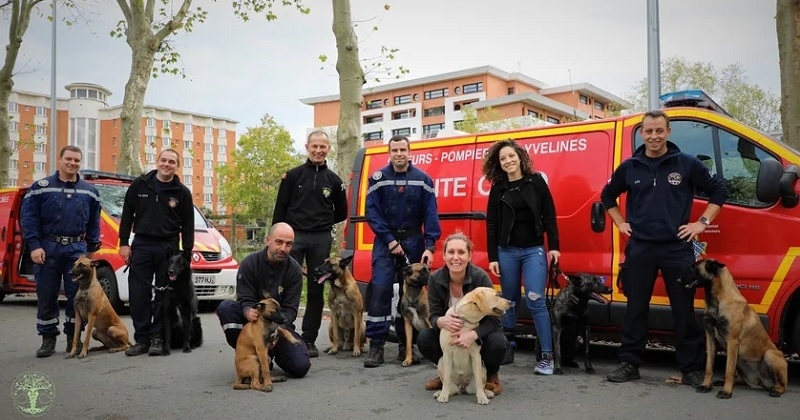It is a small team of three people led by Professor Dominique Grandjean who is at the origin of this unique innovation in the world.
Professor Grandjean’s team. Credit Veterinary School.
A year ago, Dominique Grandjean, veterinarian colonel at the Paris fire brigade and director of the Animal Husbandry and Sport Medicine Unit at the Alfort National Veterinary School, was working on an ambitious project: Nosaïs.
This project, which he has been carrying out for twenty years, consists in being able to detect diseases such as cancer or Parkinson’s disease using the smell of dogs. The results are ” fabulous », Admits the professor. Except that since the Covid-19 epidemic which is hitting the world, Professor Grandjean has decided to use his work to detect the virus.
As efficient as PCR tests
A unique experience in the world and developed in France, the detection of the virus has managed to be exported throughout the world. Last December, in the famous scientific and medical journal PLOS, the results of the Nosaïs project showed a striking success rate of 95%.
Conclusive results since the six trained dogs capable of detecting Covid-19 in people are as effective as PCR tests. However, Professor Grandjean does not rule out laboratory tests for all that. According to the professor, it is rather a first sorting which can then be confirmed in the laboratory.
The tests carried out by dogs, as effective as PCR tests, would also save time since canines would be able to detect a large number of people on a daily basis: schools, sports halls, hospitals, police stations, etc. costs would be much lower, 1 euro on average against 75 euros for PCR tests reimbursed by social security.
WHO closely interested in the project but shunned in France
The dog training place is at the Maison Alfort veterinary school, in the Paris region. Professor Grandjean, Capucine Gallet, ethologist, and Clotilde Julien, communication manager, form the small team which trains dogs in the detection of the virus.
The owners and their dogs train in specific premises. In cones are compresses soaked in the virus transmitted to them by partner hospitals in the project. Blindly, trained dogs are instructed to smell compresses that are soaked in the virus.
In the event of a positive result, the dogs, trained for 6 to 7 weeks, give the signal to their master. Of the 177 samples, the dogs were wrong about 5% of them only. Impressive results which convinced foreign countries like Australia, Lebanon, the United Arab Emirates and around thirty others to ask the French team for help.
Unfortunately, Professor Grandjean’s team is faced with skepticism from the Haute Autorité de Santé, which considers that the dog is not “a medical device”. Therefore, without subsidies or aid or recognition from the French State, Professor Grandjean and his team must fight. This particular dog brigade is also not very widespread in the country apart from southern Corsica, Oise, Dordogne, Gironde and Seine-et-Marne which were the first to benefit from it.
Professor Grandjean hopes subsequently to be able to extend this project to a whole bunch of diseases for ” save lots of people “. For its part, the WHO is closely interested in this unique project in the world.
 Dogs train to detect Covid. Credit Veterinary School.
Dogs train to detect Covid. Credit Veterinary School.
 Caroline and her Ouija dog. Credit: Radio France.
Caroline and her Ouija dog. Credit: Radio France.
–


